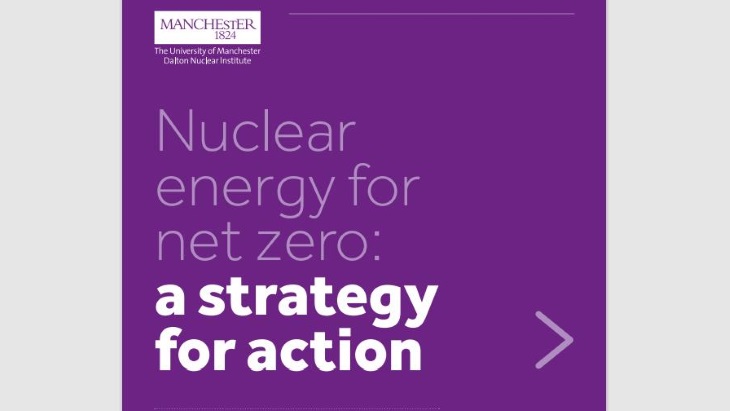The paper was written by the senior leadership team at the university's Dalton Nuclear Institute, which is home to the largest and most advanced nuclear research capability in the UK. They are: Francis Livens, director; Gregg Butler, head of strategic assessment; William Bodel, research associate in nuclear systems choice; and Juan Matthews, visiting professor in nuclear energy technology.
"Net zero by 2050 is such a massive challenge for this country that it is really all hands to the pumps," Livens said. "The reality is we need to explore all these options and evaluate them on a level playing field and come to an objective decision about, 'Does nuclear have a part to play in our energy future or not?'. Either way, the UK needs to move fast to resolve this question and take any opportunity that is there. If it continues to prevaricate, any opportunity will certainly be lost.”
Butler added: "We have developed this paper because we felt a responsibility as an impartial academic community to support our colleagues in government and industry. The UK has set a world-leading net-zero target, but simply setting the target is not enough - we need to achieve it. Now is the time to take key actions which will determine the roles nuclear can play, recognising that they should only be adopted if they contribute to an optimised economic and environmental solution. We might know a lot about nuclear energy - but it’s got to be viewed as a candidate for helping to reach net zero - not as an end in itself."
Recommendations
Recommendation 1: The state of development of UK and world advanced modular reactor (AMR) technology affirms that the demonstration reactor mentioned in the government's Energy White Paper should feature high-temperature gas-cooled reactor (HTGR) technology, with major consideration also paid to demonstrating hydrogen generation using nuclear heat.
Recommendation 2: The task of specifying, developing and pursuing the path to a UK-based HTGR demonstrator should be given to a suitable body that is equipped and empowered to deliver the HTGR project. This would include directing all R&D necessary to define an optimum route, monitoring whether and how these optima change as studies progress, and re-optimising programmes accordingly.
Recommendation 3: R&D into closed fuel cycles should be continued to allow the UK to track developments in these systems and to gauge whether, or when, such systems will find a place in the UK energy market.
Recommendation 4: An ongoing UK view of the developments in AMR systems should be maintained and led by a body that is not conflicted by claims and lobbying by any particular system proposer. The Generic Feasibility Assessment has provided an example of a platform that could host this task, but a suitably 'interest-free' organisation would need to be set up with exemplary peer review.
Recommendation 5: A suitable broadly-based advisory body should be engaged to offer advice to government on the forward nuclear programme. This could be the Nuclear Innovation Research and Advisory Board (Nirab), or a successor, but Nirab would appear to have established the possible extent and value of such advice.
Recommendation 6: The Climate Change Committee should explore, with suitable assistance, the possibilities of a wider role for nuclear in the net-zero path.
Recommendation 7: The Energy Systems Catapult (an independent, not-for-profit organisation for industry, government, academia and research) should, with assistance from other modelling expertise, set up and run transparent level playing field models to monitor economic developments. This will motivate improvements and detect unrealistic optimism.
Recommendation 8: A platform such as that recommended for nuclear energy in recommendation four should be established for all energy sources present in the net-zero path, to give a clear and unbiased view of the current status of net zero.
Optimism
The fact the government has embarked on a 30-year action plan is "a great reason for optimism", the paper says, but implementation of nuclear energy "where appropriate and advantageous" must avoid being "side-lined by unsupported hyperbole".
"It is to be hoped that the ‘best for the UK, best for the planet’ message can be turned into reality. Regarding timescales, the present situation is crucial, with any delays immediately manifesting themselves on the critical path for a nuclear demonstrator by 2030, and by inference the strong prospect of negatively impacting the 2050 deadline," it says.








_97013.jpg)






